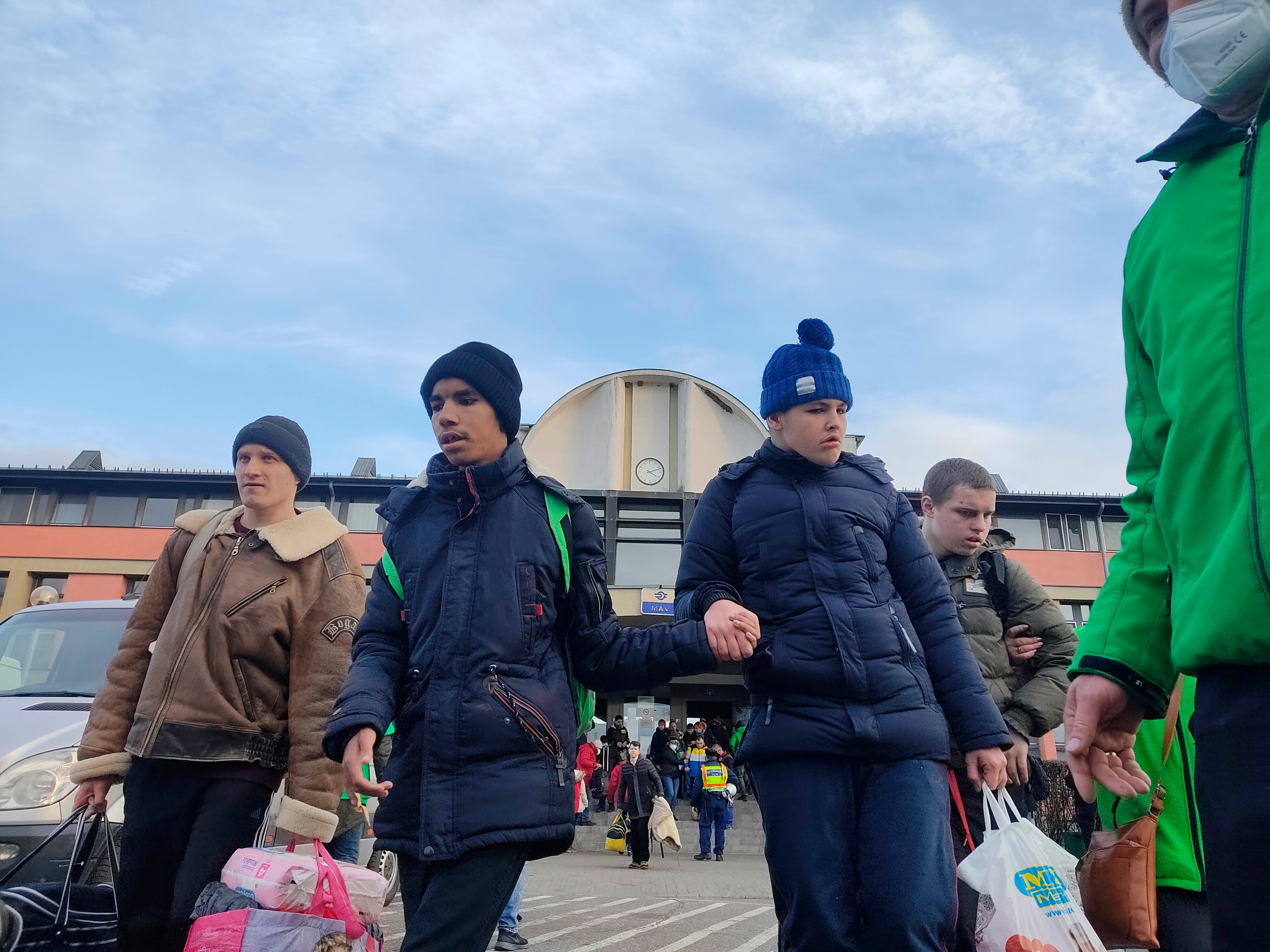Disabled orphans fleeing Kyiv received by Poles, Hungarians
Some of Ukraine’s most vulnerable citizens have reached safety in Poland through an effort of solidarity and compassion that transcended borders and raised a powerful counterpoint to war

Your support helps us to tell the story
From reproductive rights to climate change to Big Tech, The Independent is on the ground when the story is developing. Whether it's investigating the financials of Elon Musk's pro-Trump PAC or producing our latest documentary, 'The A Word', which shines a light on the American women fighting for reproductive rights, we know how important it is to parse out the facts from the messaging.
At such a critical moment in US history, we need reporters on the ground. Your donation allows us to keep sending journalists to speak to both sides of the story.
The Independent is trusted by Americans across the entire political spectrum. And unlike many other quality news outlets, we choose not to lock Americans out of our reporting and analysis with paywalls. We believe quality journalism should be available to everyone, paid for by those who can afford it.
Your support makes all the difference.Some of Ukraine's most vulnerable citizens have reached safety in Poland through an effort of solidarity and compassion that transcended borders and raised a powerful counterpoint to war.
On Wednesday, a train pulled into the station in Zahony, Hungary carrying about 200 people with severe physical and mental disabilities — residents of two orphanages for the disabled in Ukraine’s capital of Kyiv that were evacuated as Russian forces battered the city.
“Territorially, the orphanages are where the rockets flew, where there were bursts of rifle fire. A metro station near the orphanage was blown up,” said Larissa Leonidovna, the director of the Svyatoshinksy orphanage for boys in Kyiv. “We spent more than an hour underground during a bombing.”
The disabled refugees, most of them children, disembarked the train into the cold wind of the platform and into the arms of dozens of Poles and Hungarians waiting to receive them. From there, they were escorted to four waiting buses, sent from Poland by the Catholic relief organization Caritas.
With the help of the deputy mayor of Kyiv along with the city's child protection office, Caritas organized the evacuation from the capital as a Russian assault intensified.
Overnight, Associated Press reporters in Kyiv heard at least one explosion before videos started circulating of apparent strikes on the city. The targets weren't immediately clear.
Barbara Smyrak, the lead organizer of the Caritas delegation transporting the children, said they will be placed in rehabilitation centers in the southwestern Polish city of Opole after completing the 560-kilometer (350-mile) drive.
The U.N. refugee agency said Thursday that as of midnight in Central Europe, 1 million people had fled Ukraine since the start of Russia’s invasion a week ago, an exodus without precedent in this century for its speed.
The tally from UNHCR amounts to more than 2% of Ukraine’s population, which the World Bank counted at 44 million at the end of 2020, and the number is growing. The agency has predicted that up to 4 million people could eventually leave Ukraine but cautioned that even that projection could be revised upward.
While many of those fleeing are able-bodied adults, choosing to brave long and sometimes dangerous journeys to bring themselves and their families to safety, other Ukrainians are at the mercy of their caregivers to deliver them out of danger.
Viktoria Mikolayivna, deputy director of the Darnytskyy orphanage for girls, said that 216 people had arrived in Zahony, Hungary from the Kyiv orphanages - "the children along with their chaperones.”
After leaving Kyiv and traveling by bus toward the Polish border, they encountered miles-long lines of cars carrying other refugees from Ukraine fleeing toward safety in the European Union.
With the prospect of waiting for untold hours, the group redirected their route to Hungary in hopes of finding safety faster.
Leonidovna, the director of the Svyatoshinksy orphanage for boys, said the day-long journey from Kyiv had been arduous — and there was still another long bus ride to go.
“It is very difficult, you can see that it is very difficult, they all need special care and support," she said of the children.
___
Jamey Keaten in Geneva contributed to this report.
___
Follow the AP’s coverage of the Ukraine crisis at https://apnews.com/hub/russia-ukraine